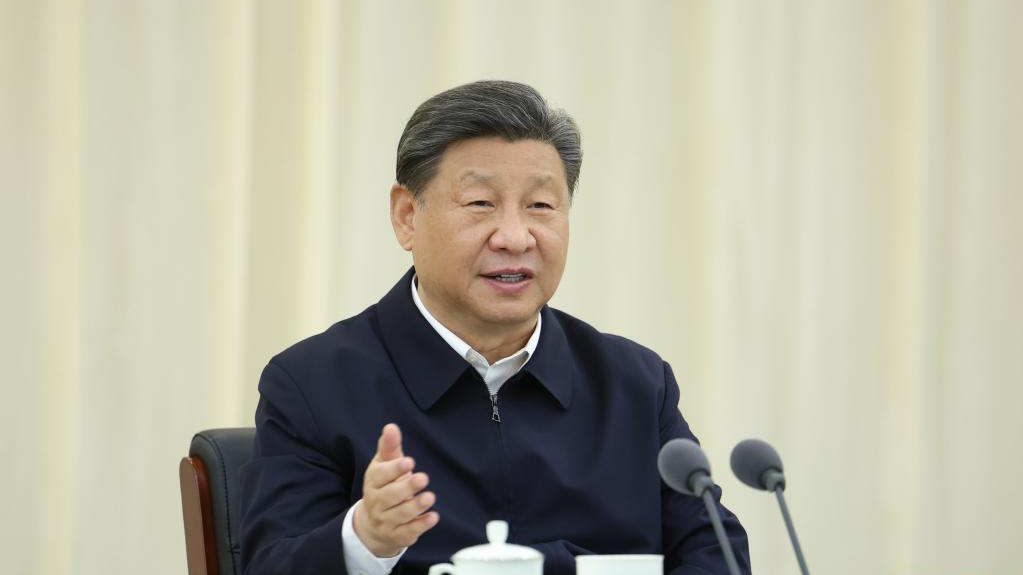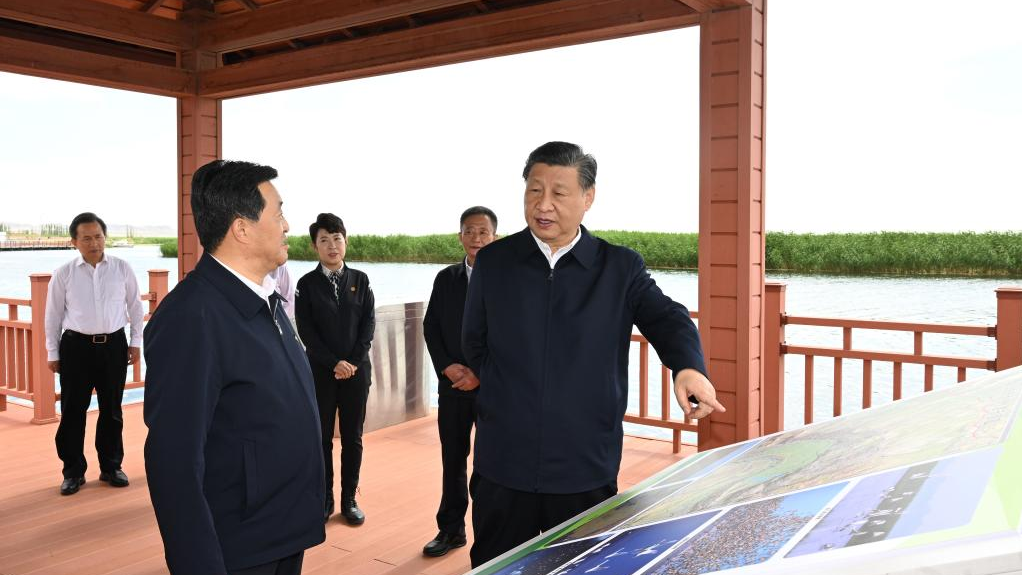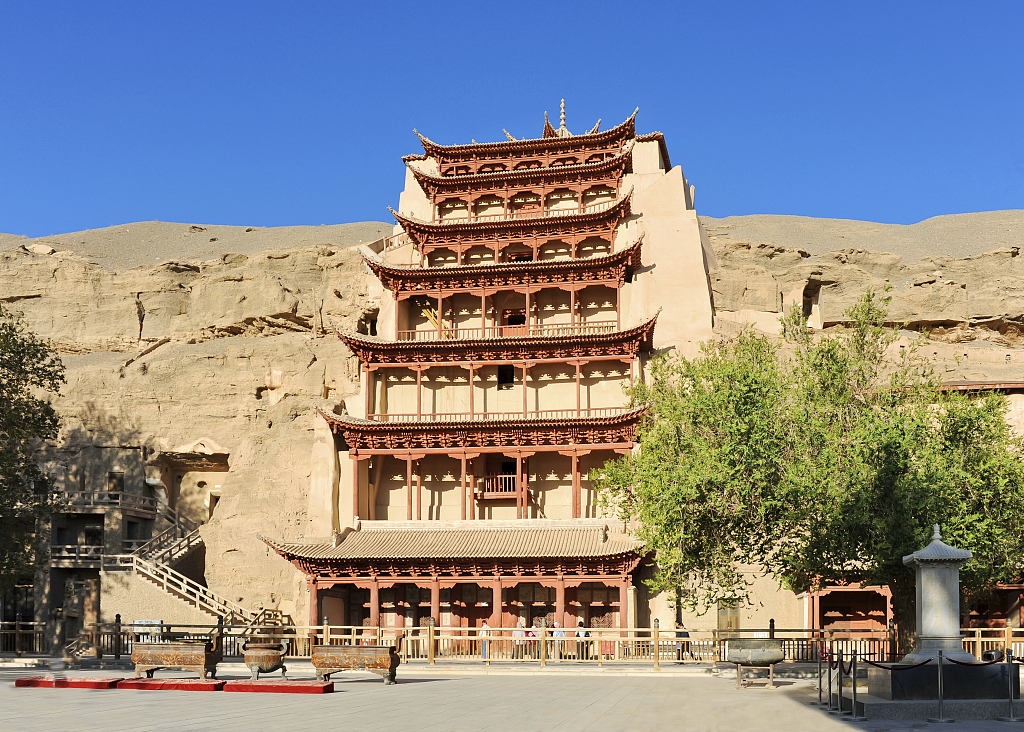【CGTN】夏璐:Green Great Wall: Curbing desertification for a beautiful China
发布时间:2023-06-07
General Secretary of the Communist Party of China (CPC) Central Committee Xi Jinping, who is also Chinese president and chairman of the Central Military Commission, presides over a symposium on strengthening the comprehensive prevention and control of desertification and promoting the construction of crucial ecological projects. Here he delivers a speech in Bayannur, north China's Inner Mongolia Autonomous Region, June 6, 2023. /Xinhua
On this year's World Environmental Day, General Secretary of the Communist Party of China (CPC) Central Committee Xi Jinping, also Chinese president and chairman of the Central Military Commission, went on a two-day inspection tour to Bayannur, a Yellow River bank city located in the northwestern part of Inner Mongolia Autonomous Region with a long history of desertification. While giving highly praising remarks to achievements of the Three-North Shelterbelt Forest Program in terms of ecological preservation, Xi continued to call for sustained efforts to create new miracles in tackling desertification and building a beautiful China.
What is desertification?
According to the United Nations Convention to Combat Desertification (UNCCD), an international treaty passed by the UN in 1994, desertification is a process in which natural or human causes reduce the biological productivity of drylands (arid and semiarid lands). The declining trend in productivity may be resulting from climate change, deforestation, overgrazing, poverty, political instability, unsustainable irrigation practices, or combinations of these factors. Some experts say that desertification is a silent and invisible crisis that is destabilizing communities on a global scale.
In fact, desertification has been posing serious challenges to sustainable development and humanity's ability to survive in many areas of the world. Over 3.2 billion people worldwide are negatively impacted by desertification, whereas over 10 percent of GDP in total is lost due to desertification per year. Currently, about 500 million people live within areas that have experienced desertification between the 1980s and 2000s.
Desertification is by no means a simple environmental issue; it also aggravates existing economic and sociopolitical issues like poverty, poor health, food insecurity, water scarcity, forced migration, and ineffective governance over climate change or natural disasters. In some certain circumstances, it will even cause social instability. Therefore, curbing desertification is not only a task set by the UN, it also attests the governability of most countries around the world.

General Secretary of the CPC Central Committee Xi Jinping, also Chinese president and chairman of the Central Military Commission, visits Wuliangsu Lake in Bayannur, north China's Inner Mongolia Autonomous Region, June 5, 2023. /Xinhua
What has the Chinese government done?
The Chinese government signed the UNCCD and put it into effect in the mid-1990s. Under the strong and effective leadership of the Communist Party of China, it has placed great emphasis on the comprehensive task of environmental protection and ecological preservation for a long time.
After the founding of the People's Republic of China (PRC), the CPC central leadership had full awareness of the strategic meaning of forestation and the prevention of water and soil erosion. In 1972, though the national economic construction was in low tide, the then-leadership still decided to send delegates to the UN conference on the human environment in Sweden, making China among the earliest cohort of countries to set the common principles of humanity's obligation to the global environment.
In the reform and opening-up era, the CPC central leadership has increasingly formed environmental and ecological policies systematically and strategically. The year 1978 was not only the starting point of China's reform and opening-up, it also marked the beginning of China's great strategic decision of the Three-North Shelterbelt Forest Program, an artificial forestry ecological project covering northwestern, northern, and northeastern China with an aim of curbing wind-sand disasters as well as water and soil erosion. Since 1983, to protect the environment has been enshrined as one of China's basic national strategies.
Why is ecological civilization so important to building a beautiful China?
Since the 18th National Congress of the CPC, guided by Xi Jinping Thought on ecological civilization and committed to the new development idea, China has made the response to climate change a higher priority in state governance. Chinese national and related local governments have taken coordinated approaches to conserve and restore the ecosystems of mountains, rivers, forests, farmland, lakes, grasslands and deserts, carrying out large-scale land afforestation. As a result, during 2016-2020, China conducted desertification control on almost 11 million hectares, addressed stony desertification on 1.65 million hectares, and applied comprehensive soil erosion treatment to an additional 310,000 square kilometers of land.
The Chinese government has made it clear that ecological projects including desertification are key to ecological security, the building of a strong state and the sustainable development of the entire Chinese nation. And these efforts are not merely for China's own sake, but are also carried out through a sense of responsibility to human civilization. China has been making every effort to tackle natural and climate issues, and to help foster a new relationship by which humanity and nature can both live and prosper in harmony.
作者:夏璐 中国人民大学国家与发展战略研究院研究员
原文链接:Green Great Wall: Curbing desertification for a beautiful China







